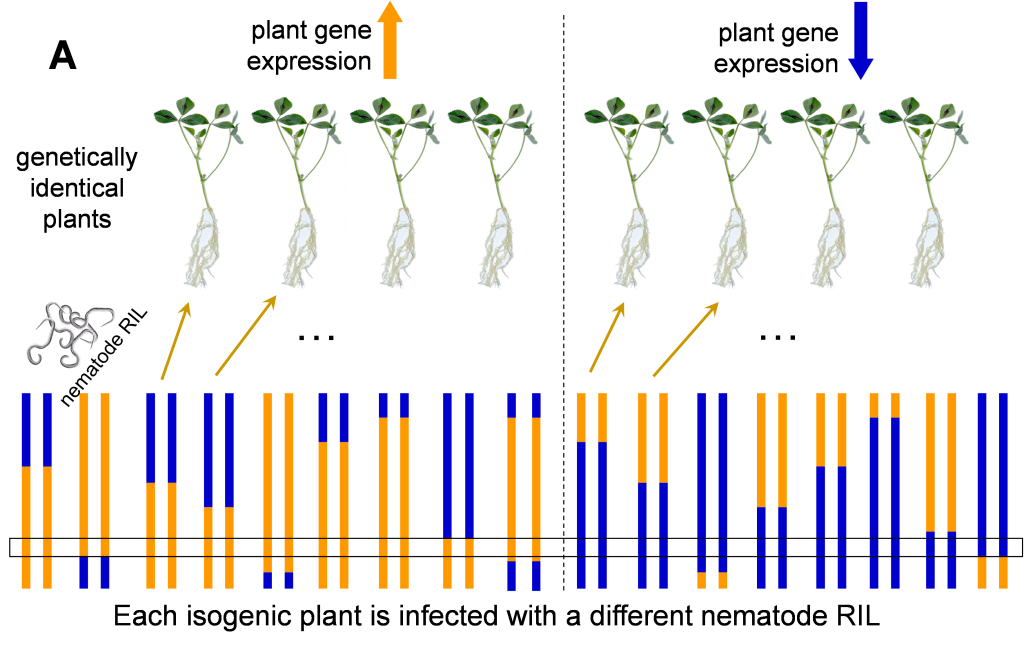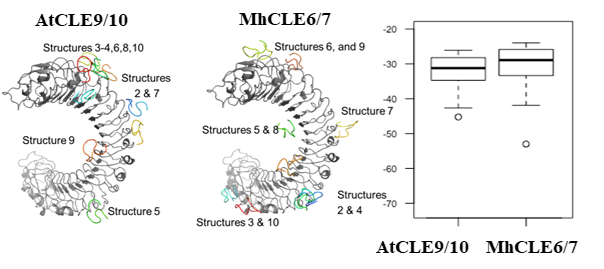Our research focuses on the underlying mechanisms of host-nematode symbioses. We utilize genetic and genomic tools to dissect the biology behind disease and developmental signaling, with a focus on responses to biotic and abiotic stress. Leveraging the unique biology of an obligate parasite, Root-Knot Nematode (Meloidogyne spp.), allows us to interrogate basal plant biology. The long-term goals of our research are to inform novel control measures and increase plant adaptability to environmental stress.

Biotic and Abiotic Stress
The circadian clock is fundamental to many life functions. The ability to coordinate daily biochemical and metabolic activities based on environmental cues, like temperature, is important to all life. A less recognized role for the circadian clock is that of regulating responses to pathogen attack. With the observed and expected changes in global climate, there is a critical need to understand the importance of thermocycles in terms of plant growth and development, and their effects on plants response to pathogens. The major goals of this project are to identify and quantify differential plant responses to pathogen attack under normal night temperature (NNT) and warmer night temperature (WNT) and to dissect the genetic architecture in plants underpinning both these different responses and the signaling that occurs between plant host and pathogen. We use the powerful genetic tools available in tomato and Root-Knot Nematode (RKN: Meloidogyne hapla).
Nematode ID with Machine Learning
Plant-parasitic nematodes (PPN) are one of the most important pests of all major cultivated crops, responsible for over 125 billion dollars in yield losses annually. Identifying nematode species and abundancies allows for informed management recommendations and is a platform for the detection of emerging pests that direct quarantine procedures. However, there are significant gaps in current PPN identification services nationwide that limit informed management practices, quarantine protocols and responsiveness to new and emerging pathogen threats. Here we will develop artificial intelligence-based approaches to increase the accessibility, capacity and accuracy of nematode identification on a national scale. The products of this work will be designed for use by nematode and plant disease diagnosticians to increase throughput and quality of nematode identification and directly connect these labs with national efforts to rapidly detect emerging pathogen threats.


Nematode Peptides Augment Plant Nutrient Uptake
The plant parasitic Root-Knot Nematode (RKN) encodes the potential to unlock universal plant peptide signaling and direct a wide range of plant physiological processes to increase agricultural yield and quality. Small signaling peptides regulate many diverse aspects of plant physiology, including responses to pathogen stress. How unique 5-30 amino acid sequences impart specific and distinct biological functions remains a considerable knowledge gap in our understanding of plant physiology. RKN elicits a limited range of plant physiological processes during symbiosis that are identical across its wide and diverse host range of over 2,000 species and include plant growth and nutrient use efficiency. Remarkably, RKN genomes encode suites of plant-like signaling peptides.
